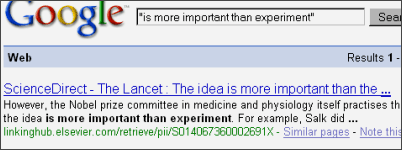Thursday, January 3, 2008
Google Chains
“The idea is more important than the experiment;
Implementation is more important than idea;
Intention is more important than implementation;
Inspiration is more important than intention;
Habit is more important than inspiration;
Habitat is more important than habit;
Proximity is more important than habitat;
Status is more important than proximity;
Class is more important than status;
Culture is more important than class;
IQ is more important than culture;
Emotional intelligence is more important than IQ;
Social intelligence is more important than emotional intelligence.”
This “Google chain” was created semi-automatically using Google search queries, always picking the first (grammatically meaningful) result. For instance, starting out with the search query “is more important than experiment” the first result snippet reads “the idea is more important than experiment.” Building on this new word “idea” you located, you can then go and search for “is more important than idea” to get the next word from the snippets... and so on, until you hit on a dead end.

You can also use other comparative “glue phrases” to create a chain, like “is greater than,” “is better than,” (see Lifehacker’s search tips) “is smaller than,” “is dumber than,” “is richer than,” “is faster than” and so on.
Glue phrases are a potentially powerful approach. Using Google, they work better the more data is indexed, and theoretically even allow you to spawn new facts (new as in: knowledge not yet written, or not yet published online, or not yet indexed by Google).
For example: the query “[name] is married to *” plus the query “[name]’s mother was *” allows you to deduce that “[result of asterisk 1]’s mother-in-law was [result of asterisk 2]”. (With [name] being, say, Marie Curie, or Al Capone. The only problem today? There’s likely not enough texts with enough variants written on [name], even if they are famous...) You can combine this approach of glue phrases with the Googleshare algorithm, meaning that you can count the number of occurrences to see which potential fact collected is more likely to be correct.
A future AI, perhaps one with more direct access to Google’s data allowing a more flexible parser, may build a giant chain of such deductions to form entirely knew theories or knowledge. Right now, Google’s deductions – try querying for al capone married to find the direct result “Spouse: Mae Josephine Coughlin” courtesy of the Google Q&A onebox –, while already advanced software, may only be the straightforward beginning.
>> More posts
Advertisement
This site unofficially covers Google™ and more with some rights reserved. Join our forum!
